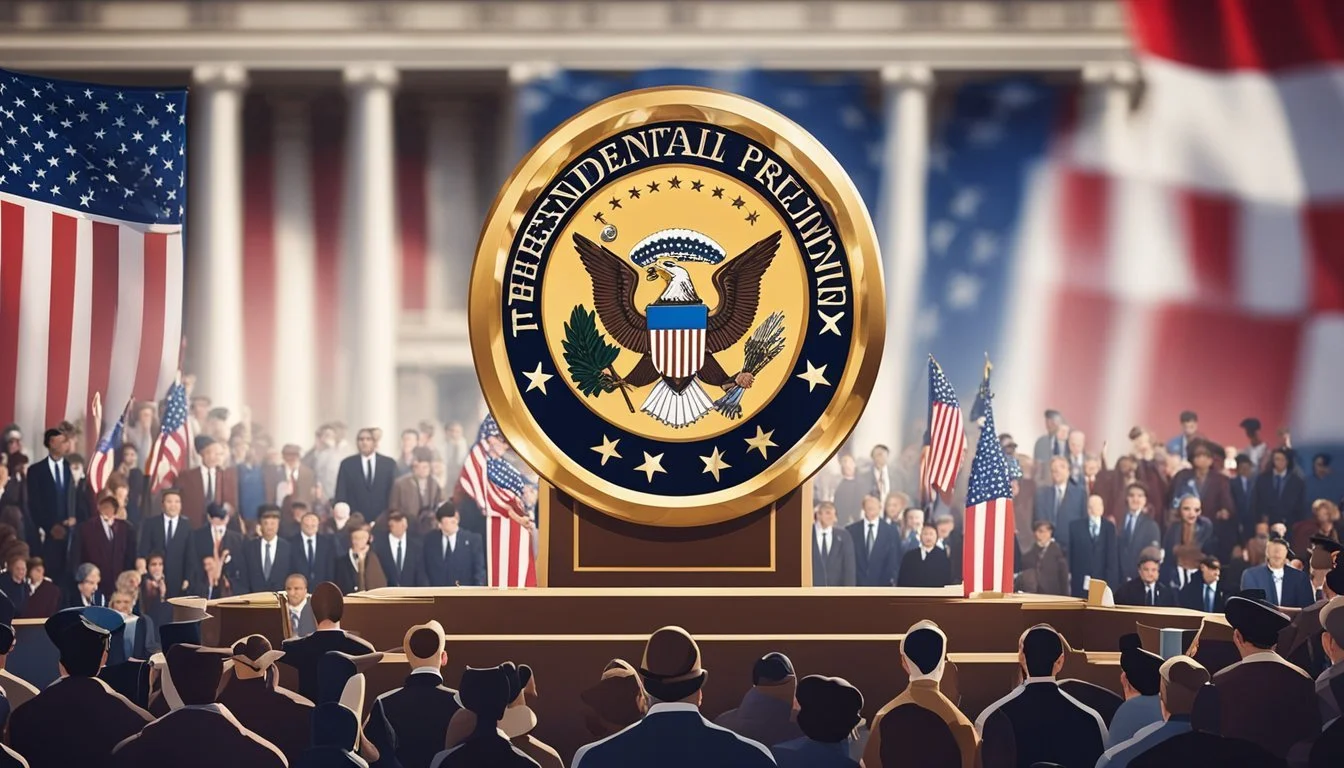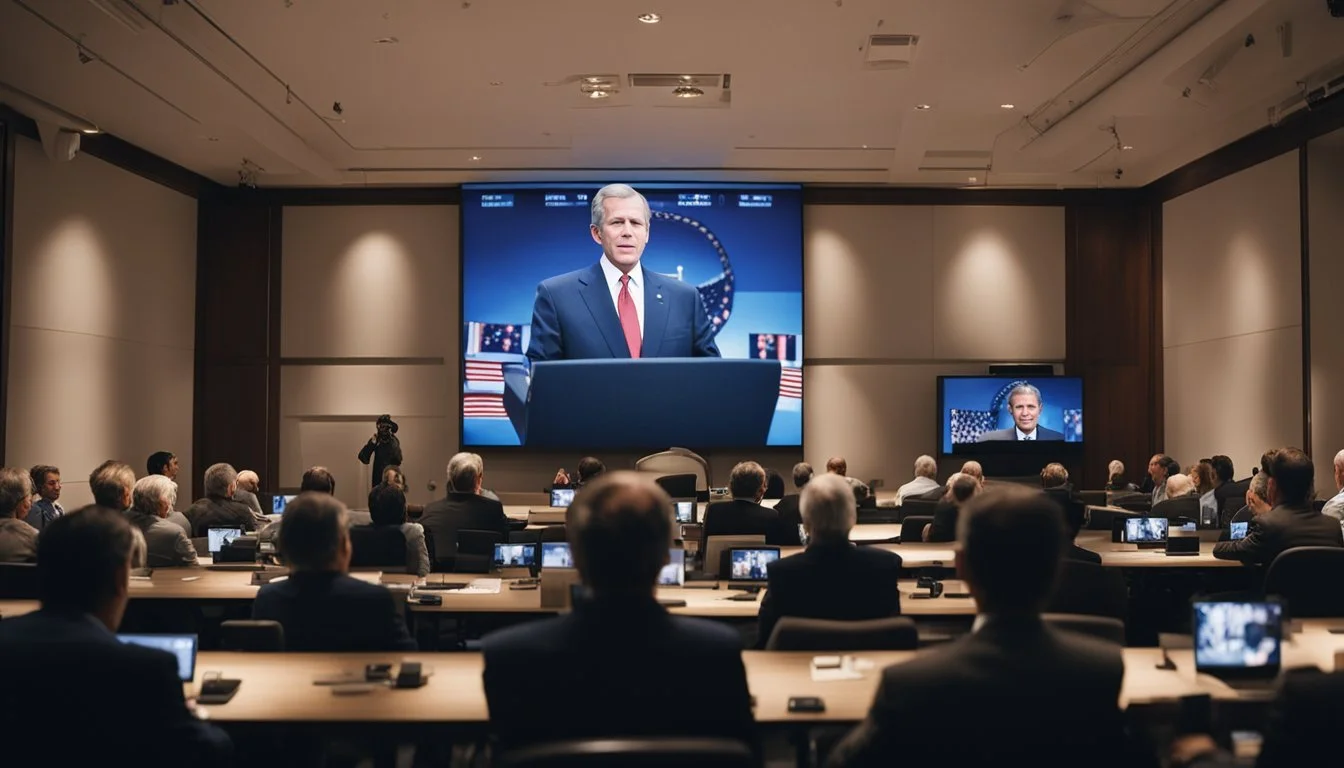8 Controversial Documentaries on George W. Bush's Post-9/11 Presidency
A Critical Look at the War on Terror Era
George W. Bush's presidency was profoundly shaped by the September 11, 2001 terrorist attacks. His administration's response to this tragedy and subsequent policy decisions have been the subject of intense scrutiny and debate.
Several documentary filmmakers have explored the controversies surrounding Bush's post-9/11 presidency, offering critical perspectives on issues like the Iraq War, counterterrorism measures, and executive power. These films provide viewers with thought-provoking analyses of a pivotal period in American history, challenging official narratives and sparking important discussions about national security, civil liberties, and foreign policy.
1) Fahrenheit 9/11 (2004)
Michael Moore's documentary "Fahrenheit 9/11" sparked intense debate upon its release. The film critically examines George W. Bush's presidency and the aftermath of the September 11 attacks.
Moore's documentary explores the Bush administration's response to 9/11 and the subsequent Iraq War. It raises questions about the motivations behind these military actions and their consequences.
The film garnered both praise and criticism for its provocative approach. Some viewed it as a powerful critique of the Bush presidency, while others accused Moore of bias and factual inaccuracies.
"Fahrenheit 9/11" became the highest-grossing documentary of all time upon its release. It won the Palme d'Or at the 2004 Cannes Film Festival, a rare feat for a documentary.
The documentary's release during an election year amplified its impact. It fueled discussions about the Iraq War, media coverage, and the Bush administration's policies.
More information on Fahrenheit 9/11
2) Bush's Brain (2004)
"Bush's Brain" examines the influential role of Karl Rove in George W. Bush's political career. The documentary explores Rove's strategies and tactics in shaping Bush's image and policies.
Directors Joseph Mealey and Michael Shoob investigate allegations of Rove's involvement in smear campaigns against Bush's opponents. They present interviews with political insiders and journalists who shed light on Rove's methods.
The film delves into Rove's background and his long-standing relationship with Bush. It analyzes how Rove helped craft Bush's public persona and political messaging during his gubernatorial and presidential campaigns.
"Bush's Brain" raises questions about the extent of Rove's influence on Bush's decision-making as president. It explores controversial topics such as the Iraq War and domestic policy initiatives.
The documentary sparked debates about the role of political advisors in shaping presidential administrations. It offers viewers a critical look at the inner workings of Bush's White House.
3) The World According to Bush (2004)
"The World According to Bush" is a French documentary directed by William Karel that examines George W. Bush's presidency. The film focuses on the 1000 days following the September 11 attacks and the subsequent invasion of Iraq.
Karel's documentary delves into the influence of neoconservative hawks on U.S. foreign policy during Bush's administration. It explores how this group shaped decision-making processes in the White House.
The film also investigates the Bush family history, including George W. Bush's grandfather Prescott Bush. It highlights Prescott's business connections to German companies during a controversial period.
"The World According to Bush" presents a critical view of the Bush presidency. It analyzes key events and decisions that defined his time in office, particularly in relation to national security and foreign affairs.
The documentary uses interviews and archival footage to construct its narrative. It aims to provide viewers with a deeper understanding of the forces at play during Bush's tenure as president.
4) 9/11: Press For Truth
"9/11: Press For Truth" (2006) examines the aftermath of the September 11 attacks. The documentary focuses on the efforts of five widows, known as the "Jersey Girls," who pushed for an official investigation into the events.
The film explores the challenges faced by families seeking answers about the attacks. It highlights their frustration with the 9/11 Commission and its perceived lack of thoroughness.
Key points covered include unanswered questions about intelligence failures and potential Saudi involvement. The documentary also touches on the initial reluctance of President George W. Bush and Vice President Dick Cheney to testify before the Commission.
"9/11: Press For Truth" uses interviews, news footage, and government hearings to present its case. It raises concerns about the official narrative surrounding the attacks and their aftermath.
The film received praise for giving voice to families affected by 9/11. Critics noted its compelling presentation of alternative perspectives on the events and subsequent investigations.
5) The Power of Nightmares (2004)
The Power of Nightmares is a three-part BBC documentary series directed by Adam Curtis. It explores the parallel rise of radical Islamism and neoconservatism in the post-9/11 era.
Curtis argues that both movements exploited fear to advance their agendas. The series examines how politicians and leaders used the threat of terrorism to maintain power and control.
The documentary challenges the notion of an organized al-Qaeda network. It suggests that the perceived threat was exaggerated to justify military interventions and curtail civil liberties.
Curtis uses extensive archival footage to trace the historical roots of these ideologies. He highlights key figures like Sayyid Qutb and Leo Strauss who influenced their development.
The series sparked controversy for its provocative thesis. Critics praised its thought-provoking analysis, while others questioned its conclusions about the nature of terrorist threats.
More information on The Power of Nightmares
6) War Made Easy (2007)
"War Made Easy" examines how U.S. presidents have used media manipulation to gain public support for military interventions. The documentary focuses on the Bush administration's tactics during the Iraq War.
Narrated by Sean Penn, the film draws parallels between the selling of the Iraq War and past conflicts. It highlights how government officials and media pundits promoted war through carefully crafted messaging.
The documentary features archival footage of presidential speeches and news reports. It exposes the repetitive nature of pro-war rhetoric across different administrations, including George W. Bush's.
"War Made Easy" critiques the media's role in uncritically amplifying government claims about threats to national security. It argues that this pattern of behavior contributed to public support for the Iraq War.
More information on "War Made Easy"
7) Breaking the Silence: Truth and Lies in the War on Terror (2003)
John Pilger directed this documentary examining the U.S. response to 9/11 and subsequent military actions. The film critiques the Bush administration's justifications for invading Afghanistan and Iraq.
Pilger argues that civilian casualties in Afghanistan were higher than reported. He suggests up to 3,000 civilians died during bombing campaigns, contrasting this with official narratives.
The documentary questions the evidence used to support the Iraq invasion. It challenges claims about weapons of mass destruction and alleged links between Saddam Hussein and al-Qaeda.
Pilger interviews political figures and analysts to support his thesis. He presents viewpoints critical of U.S. foreign policy decisions in the years following 9/11.
The film received several accolades, including a Gold Award at the WorldMedia Festival in Hamburg. It was also nominated for Best Documentary at the BAFTA Awards.
8) The Great Deception (2004)
"The Great Deception" is a controversial documentary that scrutinizes the official narrative of the September 11 attacks. The film questions the government's account of events and presents alternative theories about what may have transpired.
Directed by Anthony J. Hilder, the documentary examines various aspects of 9/11, including the collapse of the World Trade Center buildings and the Pentagon attack. It features interviews with researchers, eyewitnesses, and experts who challenge the mainstream version of events.
The film explores potential motives behind the attacks, suggesting they may have been orchestrated to justify military interventions in the Middle East. It also analyzes the Bush administration's response and subsequent policies implemented in the name of national security.
"The Great Deception" sparked debate upon its release, with critics dismissing its claims as unfounded conspiracy theories. Supporters argue it raises important questions about the official 9/11 narrative that warrant further investigation.
More information on "The Great Deception" documentary
The Impact of 9/11 on George W. Bush's Presidency
The September 11, 2001 terrorist attacks dramatically altered George W. Bush's presidency. His administration swiftly implemented new national security policies and adopted an aggressive foreign policy stance.
Immediate Policy Changes
Bush's response to 9/11 was swift and far-reaching. He created the Department of Homeland Security to coordinate anti-terrorism efforts. The USA PATRIOT Act expanded law enforcement powers for counterterrorism.
The Transportation Security Administration was established to tighten airport security. Intelligence gathering and sharing between agencies increased significantly.
Bush's approval ratings soared to 90% in the aftermath of the attacks. This surge in popularity gave him political capital to pursue his national security agenda.
Bush Doctrine
The Bush Doctrine emerged as a key foreign policy framework. It emphasized preemptive military action against potential threats to U.S. security.
The doctrine justified the 2003 invasion of Iraq, claiming Saddam Hussein possessed weapons of mass destruction. It also supported the idea of promoting democracy in the Middle East as a counter to extremism.
Bush's "War on Terror" became the central focus of his presidency. Military operations in Afghanistan aimed to dismantle Al-Qaeda and remove the Taliban regime.
The doctrine faced criticism for its unilateral approach and the controversial use of enhanced interrogation techniques on terror suspects.
Controversial Decisions and Actions
The Bush administration faced intense scrutiny for several controversial policies implemented after 9/11. These decisions had far-reaching consequences both domestically and internationally.
Iraq War Invasion
In March 2003, President Bush ordered the invasion of Iraq, citing intelligence claiming Saddam Hussein possessed weapons of mass destruction. This decision proved highly contentious.
The intelligence used to justify the war was later discredited. No WMDs were found in Iraq.
The conflict resulted in thousands of U.S. military casualties and hundreds of thousands of Iraqi civilian deaths. It destabilized the region and cost trillions of dollars.
Critics argued the war diverted resources from fighting al-Qaeda and was not directly related to the 9/11 attacks. Supporters claimed it removed a dangerous dictator and attempted to bring democracy to Iraq.
Use of Enhanced Interrogation Techniques
The Bush administration authorized the use of controversial interrogation methods on terrorism suspects. These included waterboarding, sleep deprivation, and stress positions.
Officials argued these techniques were necessary to obtain critical intelligence and prevent future attacks. Critics labeled them as torture and violations of human rights.
The CIA's use of these methods at secret "black sites" drew international condemnation. It damaged America's moral standing and was seen by many as contrary to U.S. values.
In 2014, a Senate report concluded these techniques were brutal and ineffective. It found they did not lead to actionable intelligence that prevented terrorist attacks.
Critics and Supporters
George W. Bush's post-9/11 presidency sparked intense debate and divided opinions across the political spectrum and among the general public. His policies and decisions faced both fierce opposition and staunch defense.
Political Opposition
Democrats in Congress frequently challenged Bush's national security policies. They criticized the PATRIOT Act as an overreach of government surveillance powers. Many opposed the Iraq War, arguing it was unjustified and diverted resources from fighting al-Qaeda. Some accused the administration of manipulating intelligence to build a case for war.
Liberal politicians also attacked Bush's tax cuts, claiming they disproportionately benefited the wealthy. Environmental groups criticized his climate change policies and rejection of the Kyoto Protocol. Civil liberties organizations opposed the use of "enhanced interrogation techniques" on terror suspects.
Public Opinion
Bush's approval ratings fluctuated dramatically during his presidency. They soared to 90% immediately after 9/11 but fell below 30% by 2008. Many Americans initially supported the wars in Afghanistan and Iraq. As the conflicts dragged on, public opinion shifted.
Some viewed Bush as a strong leader who kept America safe after 9/11. Others saw him as reckless and damaging to U.S. global standing. His handling of Hurricane Katrina drew sharp criticism. Conservative supporters praised his tax cuts and Supreme Court nominations. Critics attacked his response to the 2008 financial crisis.







